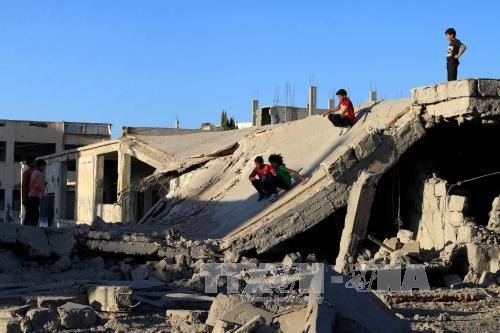(VOVworld) – The ceasefire agreement brokered by the US and Russia took effect at 7pm on September 12, coinciding with the Muslim holiday of Eid al-Adha. Some observers see this as a golden opportunity to end 5 years of violence in Syria, but most doubt the ceasefire will last.
 |
| Military operations are halted in Syria (Photo:Reuters) |
The 48-hour ceasefire was agreed on September 10, in Geneva, Switzerland, as a result of diplomatic efforts by Russia and the US. If the deal is complied with, there will be another week of ceasefire thereafter. Under the agreement, the Syrian army has to halt its military operations nationwide and the opposition forces will cease their attacks. Insurgents and government troops are obliged to withdraw from 2 major conflict areas in Aleppo to create a non-militarized zone to give humanitarian organizations access to civilians.
Russia and the US see the ceasefire as a turning point, enabling factions to return to the negotiating table.
Positive signal
According to US Secretary of State John Kerry, the truce will be a starting point for restoring peace restoration and shifting the political balance in Syria. Russia’s Foreign Minister Sergei Lavrov said Moscow and Washington will do all they can to make sure the plan is respected by the parties involved.
On September 11, the Syrian government declared its acceptance of the deal. The same day, in a letter sent to the US, groups belonging to the Free Syrian Army faction said they will cooperate. Two officials representing these forces said they will abide by the truce. The hard-line insurgent group Ahrar al-Sham did not reject the deal this time.
Kerry said there was a reduction of violence in the first 2 hours after the truce took effect.
Grave challenges
Russian Foreign Minister Sergei Lavrov admitted that he was not 100% sure the ceasefire would be adhered to. Chairman of the Russian Upper House Committee for Foreign Affairs Konstantin Kosachev warned that whether the agreement is implemented or not depends on the attitude of the Syrian government, the armed opposition factions, and terrorist organizations who are complicating the situation in Syria.
Russia and the US differ in the way they distinguish terrorist groups from moderate opposition factions. Kerry said the two sides will continue to work together through a special center to be established in the near future.
The new truce lacks any monitoring or enforcing mechanism, like the previous ineffective deal reached in February, 2016. Analysts say that without a comprehensive monitoring mechanism, terrorist groups may take advantage of the ceasefire to consolidate their forces and deliver weapons.
The UN was cautious about the prospects of enforcing truce. UN Special Envoy for Syria Staffan de Mitsutra said his office would carefully observe the truce before making any comment.